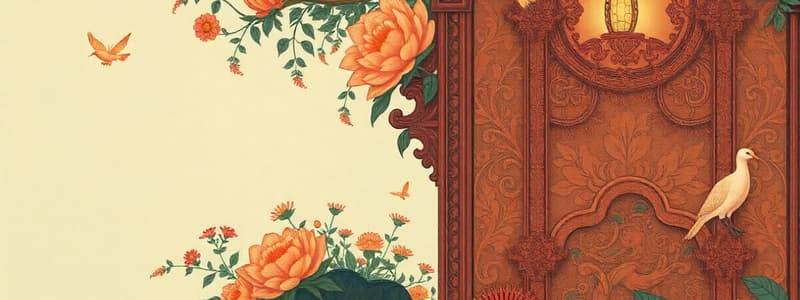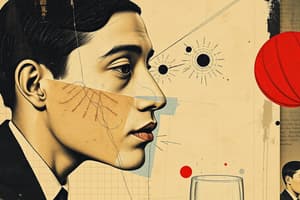Podcast
Questions and Answers
What year was the painting that depicts the heaven, crucifixion of Christ, earth, Adam and Eve, and hell created?
What year was the painting that depicts the heaven, crucifixion of Christ, earth, Adam and Eve, and hell created?
- 1962
- 1574
- 1641
- 1850 (correct)
Which architectural design does St. Paul Metropolitan Cathedral follow?
Which architectural design does St. Paul Metropolitan Cathedral follow?
- Baroque (correct)
- Renaissance
- Neoclassical
- Gothic
Who is the artist of 'The Making of the Philippine Flag'?
Who is the artist of 'The Making of the Philippine Flag'?
- Carlos “Botong” Francisco
- Fernando Amorsolo (correct)
- Federico Aguilar Alcuaz
- Leeroy New
Which tradition is depicted in Carlos “Botong” Francisco's mural painted in 1962?
Which tradition is depicted in Carlos “Botong” Francisco's mural painted in 1962?
What does the 'Cinco Marias (Tres Marias Series)' commonly depict?
What does the 'Cinco Marias (Tres Marias Series)' commonly depict?
What is the main theme of art from the 1860s to 1960s as described?
What is the main theme of art from the 1860s to 1960s as described?
What significant aspect distinguishes the art installation created by Leeroy New?
What significant aspect distinguishes the art installation created by Leeroy New?
Which statement best reflects the contemporary art practices mentioned?
Which statement best reflects the contemporary art practices mentioned?
What is the primary influence on the development of Philippine art forms?
What is the primary influence on the development of Philippine art forms?
What does the Manunggul jar signify in early Filipino culture?
What does the Manunggul jar signify in early Filipino culture?
Which art form is characterized by the performance of Kalinga women showcasing their grace and strength?
Which art form is characterized by the performance of Kalinga women showcasing their grace and strength?
How does the Angono Petroglyphs artwork connect to the cultural practices of early Filipinos?
How does the Angono Petroglyphs artwork connect to the cultural practices of early Filipinos?
In what context was the wall painting 'Langit, Lupa, at Impyerno' created?
In what context was the wall painting 'Langit, Lupa, at Impyerno' created?
What are the Angono Petroglyphs primarily composed of?
What are the Angono Petroglyphs primarily composed of?
Which aspect of life does the Banga dance NOT represent?
Which aspect of life does the Banga dance NOT represent?
What can be inferred about the relationship between art and religion in the development of Philippine art?
What can be inferred about the relationship between art and religion in the development of Philippine art?
Flashcards
Color Theory
Color Theory
A concept in visual arts and design explaining how colors affect each other and create different moods and feelings.
Manunggul Jar
Manunggul Jar
A burial jar found in Palawan, believed to represent the Filipino belief in life after death.
Angono Petroglyphs
Angono Petroglyphs
Petroglyphs (rock carvings) found in Binangonan, Rizal, showing human and animal figures from the Neolithic period.
Banga Dance
Banga Dance
Signup and view all the flashcards
Langit, Lupa, at Impyerno
Langit, Lupa, at Impyerno
Signup and view all the flashcards
Early Filipino Art Forms
Early Filipino Art Forms
Signup and view all the flashcards
Art Forms During Spanish Colonial Period
Art Forms During Spanish Colonial Period
Signup and view all the flashcards
Development of Philippine Art
Development of Philippine Art
Signup and view all the flashcards
Heaven, Earth, and Hell Painting
Heaven, Earth, and Hell Painting
Signup and view all the flashcards
Nationalist Art
Nationalist Art
Signup and view all the flashcards
The Making of the Philippine Flag
The Making of the Philippine Flag
Signup and view all the flashcards
Bayanihan by Carlos Francisco
Bayanihan by Carlos Francisco
Signup and view all the flashcards
Contemporary Art
Contemporary Art
Signup and view all the flashcards
Cinco Marias (Tres Marias Series)
Cinco Marias (Tres Marias Series)
Signup and view all the flashcards
Art Installation in Sand Dunes of Paoay
Art Installation in Sand Dunes of Paoay
Signup and view all the flashcards
Art as Power
Art as Power
Signup and view all the flashcards
Study Notes
Contemporary Philippine Arts From the Regions
- The presentation is about contemporary Philippine arts from various regions.
- Learning objectives include identifying various contemporary art forms and practices, and classifying various art forms in the Philippines.
Color Theory
- Color theory is a concept used in visual arts and design.
- It explains how colors interact with each other and how they can be combined to create specific feelings, moods, and reactions.
- A color wheel is used to illustrate how colors relate to each other.
Origin of Art
- Art comes from the Latin word "Ars," meaning skill.
Various Art Forms from the Regions
-
Ethnic Tradition:
- Art forms are primarily influenced by geographical location and the experiences of Filipinos.
- Arts reflect pagan beliefs, everyday activities (like fishing and farming), and specific decorative patterns for communities.
- Angono Petroglyphs: Located in Binangonan, Rizal, discovered in 1965 by Carlos "Botong" Francisco. The petroglyphs are rock carvings of humans and animals and date back to the late Neolithic period.
- Manunggul Jar: Found in Manunggul Cave, Lipuun Point, Palawan, during the early 1960s. It's a burial jar symbolizing the Filipino belief in life after death.
- Banga: A pot dance performed by the Kalinga people in the Philippines' Mountain Province. It showcases the elegance and skill of women.
-
Spanish Colonial Tradition:
- Art primarily reflects religious and secular influences.
- Spaniards used arts to spread the Catholic faith.
- Langit, Lupa, at Impyerno: A wall painting in St. James the Apostle Church in Paete, Laguna, dated to 1850. It displays heaven, crucifixion of Christ, Earth, Adam and Eve, and hell, with different transgressions depicted.
- St. Paul Metropolitan Cathedral: Located in Burgos, Vigan City, Ilocos Sur. The original structure was built in 1574 and replaced in 1641 and follows Baroque architectural style.
-
American Colonial and Contemporary Arts Traditions (ACT):
- Also known as "Modern Arts," spanning from the 1860s to 1960s.
- A major theme is national identity.
- Making of the Philippine Flag: A painting by Fernando Amorsolo, a Grand Old Man of Philippine Art, representing Filipino traditions and customs.
- Bayanihan: A mural painting by Carlos "Botong" Francisco showing the Filipino Bayanihan tradition – a spirit of unity and cooperation.
-
Contemporary Arts:
- Covers art created from the 1970s to the present.
- Contemporary art mirrors contemporary culture and society.
- Emerging and diverse art practices are common in this era.
- Cinco Marias (Tres Marias Series): A painting by Federico Aguilar Alcuaz portraying domestic activities.
- Art Installation in Paoay Sand Dunes: An artwork by Leeroy New symbolizing festivals, feasts, and celebrations.
Questions
- What do the presented art pieces represent?
- How do these art forms reflect Philippine culture, tradition, and development?
Development of Philippine Arts
- The development of Philippine arts is categorized into Ethnic Tradition, Spanish Colonial Tradition, American Colonial & Contemporary arts Tradition, and Contemporary Arts.
Activity 1
- Students analyze statements about the different traditions of Philippine arts and classify them as Ethnic Tradition (ET), Spanish Colonial Tradition (ST), or American Colonial and Contemporary Arts Tradition (ACT).
Activity 2
- Students are tasked with creating a simple symbolic drawing about Philippine Contemporary Arts and explain it in 3-5 concise sentences.
Additional Information
- The provided slides also include information about the different periods of Philippine art: ethnic, Spanish colonial, American colonial and contemporary, and contemporary periods.
Studying That Suits You
Use AI to generate personalized quizzes and flashcards to suit your learning preferences.




